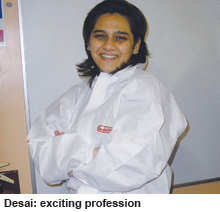The forensics scientist makes sure that victims of crime and murder/violence are thoroughly examined, appropriate tests are conducted and data interpretation is accurate
With crime and criminal activity of all types — murder, rape, kidnapping, terrorist bombings, cyber crime, and credit card frauds — rising exponentially, the demand for forensics science profes-sionals, trained to detect crimes and ferret out the guilty, is growing comm-ensurately. For science and whodunnit aficionados, the emerging career of forensics science offers ample oppor-tunities to bring ungodly law-breakers to book.
Forensics science or forensics is the application of scientific concepts and principles to the investigation of criminal and civil breaches of law. All clues collected from a crime scene are analysed by forensic scientists in specialist crime laboratories and converted into evidence adduced in courts of law. The evidence might include traces of blood, saliva, other body fluids, hair, fingerprints, footwear and tyre impressions, explosives, specimens of tissue, blood and alcohol, DNA etc. Primarily a lab-based profes-sion, forensics science requires people with highly developed analytical and investigative skills apart from in-depth knowledge of science. The forensics scientist makes sure that victims of crime and murder/violence are thoroughly examined, appropriate tests are conducted, data interpretation is accurate, and written reports are logical and comprehensible to non-scientists enabling the police to use them to solve crimes and convict criminals.
With demand for forensic scientists set to explode, several colleges and universities have introduced forensics science as a study option. The minimum eligibility criterion is graduation in any branch of science for a postgraduate programme, and Plus Two for under-graduate studies. For admission into a Masters programme in forensics science, applicants need to graduate in any of the following subjects: physics, chemistry, zoology, botany, biochemistry, micro-biology, applied science, B.Pharm, MBBS, BDS, engineering, computer science or psychology.
The National Institute of Criminology and Forensics Science, New Delhi is the country’s nodal institution for training professionals employable in the fields of criminology and forensics science, as well as for research relating to these sciences. It conducts training progra-mmes for government officers and also offers diploma and certificate courses.
Among the reputed institutes for graduate and postgraduate study programmes are the Forensics Sciences Department, Chennai; University of Delhi; Anna University, Chennai; University of Lucknow; Institutes of Forensics Science, Mumbai and Aurangabad affiliated with Mumbai University; Aligarh Muslim University, Aligarh; Dr. Harisingh Gour Vishwa Vidyalaya, Madhya Pradesh among others.
Specialisation in branches of forensics science such as forensic anthropology, archaeology, and serology improves career progression prospects. Moreover there is tremendous scope in training and employment, especially in the US.
 Career progression depends on qualifications and work experience. A forensics science graduate typically starts as a lab attendant while a postgrad starts as a junior lab assistant and progresses to scientific officer after attaining a Ph D, and subsequently to the position of senior scientific officer, assistant director and director. Pay scales range from Rs.10,000-50,000 in government agencies and departments.
Career progression depends on qualifications and work experience. A forensics science graduate typically starts as a lab attendant while a postgrad starts as a junior lab assistant and progresses to scientific officer after attaining a Ph D, and subsequently to the position of senior scientific officer, assistant director and director. Pay scales range from Rs.10,000-50,000 in government agencies and departments.
“Job opportunities are growing by the day but there’s still not much awareness of the vital importance of forensics in crime investigation and detection. But lab jobs are not the only option for forensic professionals as is commonly believed. They can also work in law firms, DNA research labs, pharma labs, corporate offices, paramedical labs, private/government security agencies, teaching and research institutions,” says Titiksha Desai, assistant professor at the Institute of Forensics Science, Mumbai (estb. 2009).
A biochemistry graduate of Mithibai College, Mumbai (2004) with a Masters in forensics science from the University of Teeside, UK (2006), Desai began her career as a research trainee at the prestigious National Institute of Crim-inology and Forensics Science, New Delhi (2007-08) before signing up with Forensics Advisory Consultancy Train-ing Services as an associate member.
In October 2009, the Institute of Forensics Science (IFS), Mumbai was promoted with a sister institute in Hyderabad, both operating under the Directorate of Higher and Technical Education, government of Maharashtra and affiliated with Mumbai University. Desai was appointed assistant prof-essor at the institute which currently offers a three-year B.Sc programme in forensics science; a one-year postgrad diploma in forensics science and related laws and a one-year postgrad diploma in digital and cyber forensics.
With rapid advances in forensics technology, Desai is optimistic about the future of forensic professionals, and believes that a sharp increase in the awareness of forensics science as a career choice is imminent. “The quality of students is improving and the number attracted to this exciting profession is rising. If at any stage the Union government decides to permit private forensics labs, it will be boomtime for forensic experts,” she predicts.
Indra Gidwani (Mumbai)